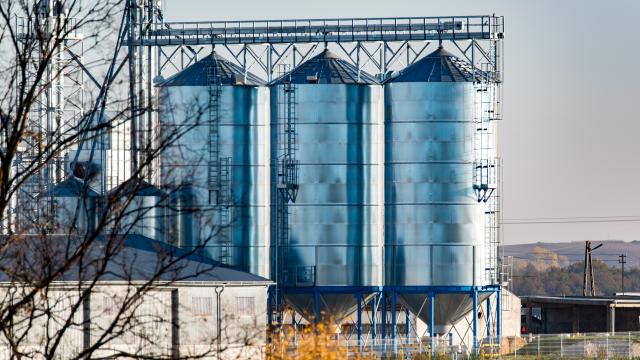
The Trump administration on Oct. 4 unveiled a plan to boost U.S. biofuels consumption starting next year to help struggling farmers, a move that cheered the agriculture industry but triggered a backlash from the oil industry.
The plan would require an unspecified increase in the amount of ethanol that oil refiners must add to their fuel in 2020, and would also aim to remove further barriers to the sale of higher ethanol blends of gasoline like E15, the Environmental Protection Agency said in a statement.
"President Trump's leadership has led to an agreement that continues to promote domestic ethanol and biodiesel production, supporting our nation’s farmers and providing greater energy security," EPA Administrator Andrew Wheeler said.
The deal is widely seen as an attempt by President Donald Trump to mend fences with the powerful corn lobby, which was outraged by the EPA's decision in August to exempt 31 oil refineries from their obligations under the RFS. This freed the refineries from the requirement to blend biofuels or buy credits from those who do.
Biofuel companies, farmers and Midwest lawmakers complained that the waivers undercut demand for corn, which is already slumping due to the U.S. trade war with China. Oil refiners say the waivers protect blue-collar jobs and have no real impact on ethanol use.
Senators from Iowa, the nation's biggest ethanol producing state, welcomed the move.
"The President heard that message and has acted on it" Republican Senator Joni Ernst said in a statement. "Our message was clear: uphold the RFS —15 billion means 15 billion," Ernst, who was instrumental in putting together the deal, said.
RELATED: Frac Spread: Ethane Markets Remain Fragile
The rules, which will be finalized after a period of public comment, would "ensure that more than 15 billion gallons of conventional ethanol be blended into the nation’s fuel supply beginning in 2020," the EPA said, without giving an exact number. Any changes to blending volume mandates for 2020 under the U.S. biofuel law, the Renewable Fuel Standard (RFS), must be finalized by Nov. 30.
Before Friday's proposal, the EPA had called for the refining industry to add 20.04 billion gallons of biofuels, including 15 billion gallons of ethanol, into their fuel in 2020. The Trump administration had also already provided a boost to E15 earlier this year by lifting an Obama-era ban on its sale during summer months.
While the move was largely welcome by biofuel groups, some industry players said they were concerned that the EPA declined to provide an exact figure for the 2020 blending quotas. A brief EPA call with reporters offered little insight, with an agency official saying only that the mandates will be based on a calculation of waived volumes over the previous three years.
Tim Gannon, a farmer from Iowa and a former official with the Department of Agriculture was sceptical.
"It is very much in question whether this gets done by 2020," he said. "Every time the President makes a promise on the RFS, his EPA administrator manages to roll it back for Big Oil... The question now is will this time be any different?"
Oil companies have consistently resisted measures to expand the biofuels market, which they view as a competitor. Refiners have vehemently complained that the requirements under the RFS cost them a fortune. Their weeks-long efforts to include oil-friendly measures in the final deal announced Friday failed.
“We are deeply concerned about the Administration’s decision to, once again, play politics with our fuel system by increasing an already onerous biofuel mandate, placing greater strain on the U.S. manufacturers he promised to protect and threatening higher costs for consumers,” the American Petroleum Institute and the American Fuel and Petrochemical Manufacturers industry groups said in a joint statement.
Trump waded into the issue early in his presidency after representatives of the refining industry complained about the high costs of compliance, seeking to tap into his administration’s support for rolling back regulation.
Trump’s EPA had since vastly expanded its use of the provision allowing small refining facilities to seek waivers if they can prove compliance would cause them disproportionate financial hardship.
Reuters has reported that small facilities owned by oil majors such as Exxon Mobil and Chevron Corp have been among the facilities securing recent exemptions.
U.S. biofuel credits traded at 27 cents each on Friday following the announcement, up from 23.50 cents each on Thursday, traders said. However, the credits came off highs as the market sought clarity on the plan's details.
Recommended Reading
US Drillers Cut Most Oil Rigs in a Week Since November
2024-04-26 - The number of oil rigs fell by five to 506 this week, while gas rigs fell by one to 105, their lowest since December 2021.
Exxon Mobil, Chevron See Profits Fall in 1Q Earnings
2024-04-26 - Chevron and Exxon Mobil are feeling the pinch of weak energy prices, particularly natural gas, and fuels margins that have cooled in the last year.
Apollo to Buy, Take Private U.S. Silica in $1.85B Deal
2024-04-26 - Apollo will purchase U.S. Silica Holdings at a time when service companies are responding to rampant E&P consolidation by conducting their own M&A.
Marathon Oil Declares 1Q Dividend
2024-04-26 - Marathon Oil’s first quarter 2024 dividend is payable on June 10.
No Silver Bullet: Chevron, Shell on Lower-carbon Risks, Collaboration
2024-04-26 - Helping to scale lower-carbon technologies, while meeting today’s energy needs and bringing profits, comes with risks. Policy and collaboration can help, Chevron and Shell executives say.



